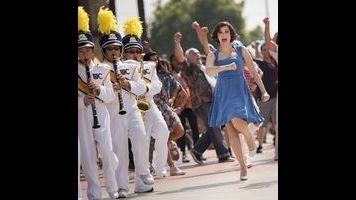There’s an origin story, but I won’t recap it here—for that, check out Molly Eichel’s excellent pre-air review or one of the many interviews co-creator and star Rachel Bloom has given over the last month—but no sequence of events could make such a show seem likely. There are jazz hands and key changes. There’s a joke about asshole-waxing. The concrete sparkles, the ensemble dances, and the word ‘abortionist’ gets used in the first five minutes. It’s incredibly improbable. It shouldn’t be. But here it is, hallelujah. Please, for the love of good television, don’t let the name deter you.
The thing about great musicals, love them or hate them, is that they’re always too big for mere words. To stick with Oklahoma! as an example: It begins with a morning so overwhelmingly beautiful, a day ahead so rich with possibility, that Rodgers and Hammerstein’s Curly can’t help but sing. It’s not an easy bar to clear, but somehow Bloom and The Devil Wears Prada screenwriter Aline Brosh McKenna pull it off, all the while not sacrificing the inherent darkness that sits at the center of this seemingly frothy confection. Optimism may drive Curly, but the forces that push Rebecca Bunch into melody aren’t quite so cheery, and it’s the tension created by those opposing forces, by the darkness and the light, that really makes the show—if you’ll pardon the expression—sing.
Look at either side of the pilot’s opening sequence. It steers from teenagers at camp to a woman on the verge of a breakdown, and from a brief reunion with a brief fling to a board room with some very, very rich people. Then it dumps us smack in the middle of a big, glossy opening number—albeit one where the lyric about destiny leads to an appearance by an exotic dancer named Destiny—before concluding with a big, gorgeous note from the protagonist, who is perched on a giant floating pretzel. Then, after the title card, Rachel is in an empty condo, crunching her prescriptions in a garbage disposal while her mother protests that this move is a ploy for attention, just like her suicide attempt (“You didn’t even break your skin, and you inconvenienced a lot of people.”)
One thread connecting these two scenes is the deep pit of bright-eyed denial in which a smart, frightened young woman has found herself. The other: she hums the theme of “West Covena” as she merrily grinds away her meds, a very modern equivalent of Snow White and her dwarves whistling while they work. To borrow from another Disney heroine: a spoonful of sugar helps the medicine go down.
There’s no way to call this anything other than a musical, but haters of showtunes need not change the channel. Bloom and McKenna have written a hell of a comedy, with jokes flying past so quick they’re easy to miss and popping up in ways one would never expect. They’re also responsible for a show that absolutely does not pass the Bechdel test, though that, according to Bloom, is part of the point. By poking, sometimes quite nastily, at the environment that makes women think they should be waiting for a sign, they rip into the fabric of what makes romantic comedy so enjoyable and insidious at once. This isn’t You’ve Got Mail, but it isn’t wholly cynical, either. It’s just a woman trying really hard to be less miserable, and going about it in what is—or at least seems like—an incredibly foolish way.
One could wish for better defined supporting characters—Donna Lynne Champlin’s Paula has some substance, but most of the supporting cast remains opaque—but that complaint aside, Crazy Ex-Girlfriend’s pilot remains a startling self-assured affair, with a name that both perfectly suits what it hopes to accomplish while not coming close to selling what it has to offer. Please, give it a shot. I’d be willing to bet you’ll be hungry for an encore.
Stray Observations
- “Time is a funny thing. Sometimes time itself tells you that it is time to move on to other moments in time, and when that time arrives, you can’t really predict it, you can’t explain it, you just have to obey the ticking clock that is destiny, and I think that this is that time.”
- “I gotta go apologize to some bitches. I’m forever changed by what I just seen.”
- “You’re pretty, and you’re smart, and you’re ignoring me, so you’re obviously my type.”
- “Ah-men. Ay-men. Ah men?”
- There’s an explicit version of “The Sexy Getting Ready Song,” this time with more ass-blood. Recommended.
- I hope we get to meet Mother Bloom, but I also sort of love that thus far she’s like the teacher in Peanuts. Wah wah wah wah.
- Bloom is obviously excellent, as is Champlin, but the supporting cast as a whole is great. Can’t wait to hear these people sing, si-ing the songs of angry men. (Sorry.)
- I admit to being a recovering musical theatre nerd, but I am also a little rusty, so I watched tonight with Allison Hendrix, the co-artistic director of Kokandy Productions (a musical theatre company in Chicago). Her verdict: adorable dudes, great voices, and choreography just terrible enough to be wonderful. She also, like me, loved the ass-blood joke.

 Keep scrolling for more great stories.
Keep scrolling for more great stories.
